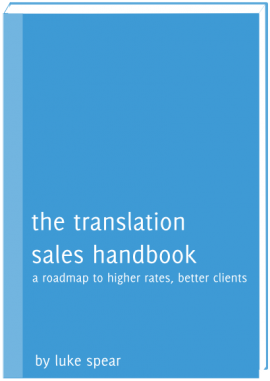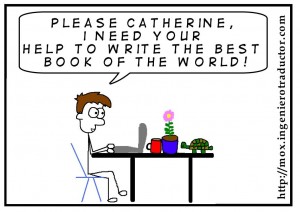
It’s such an honor to be asked by an esteemed colleague for an interview or a contribution to their book. It’s exciting and terrifying at the same time, especially when the interview/article isn’t in your native language; although, weirdly enough, I think it would be more difficult for me to write about translation in Greek now, after my daily experience of communicating entirely in English.
You can see some of our contributions in the Mentions page, but what prompted me to write this post were an interview I gave and an article I wrote recently for two great books for translators. I read The translation sales handbook by Luke Spear (@lukespear) a few days ago and I can’t describe how honored and excited I feel for having been part of it. The second book is the follow-up to Mox’s Illustrated Guide to Freelance Translation by Alejandro Moreno-Ramos (@Mox_Translator), a brilliant translator and cartoonist who sent me the above cartoon in his initial email 🙂 The book will probably be published next month, so it will be an early Christmas present for me!
Even though I’m nowhere near experienced enough in interviews and writing book articles, I wanted to share some of the lessons I’ve learned so far.
Purpose
First of all, determine the purpose of the request. If your colleague’s first email isn’t clear enough on where your answers will be used, ask. That’s particularly important in terms of the content of your contribution. For example, it might be a simple exchange of information (how do you approach new clients; what do you think about agency X; what rates do you charge). You wouldn’t want to reveal too much personal or confidential information and then see it published when you think this is just a conversation between friends.
Scope & Register
Most people send a nicely written email stating exactly what they want from you and what you’ll get out of it. Just be careful with the ones that aren’t so specific. A colleague might say that they’ll use your feedback for a blog post they’re writing. Will your answers be used ad verbum? You might have to adjust the register in that case so they are more appealing to the readers. Will the readers be interested in your personal success story or will they be looking for tips (i.e. that’s how I set my rates as opposed to this is how you should set your rates).
Make sure you understand the scope of the interview/book. Who will read it? Your contribution should be focused to the readers. Is your colleague targeting direct clients, seasoned or new translators? Who will benefit from reading your answers? If you’re not sure, talk about it with the author. You want your contribution to shine by being useful and interesting. If it doesn’t go well with the rest of the interviews/book, it will stand out for the wrong reasons.
Do your research
Has the author/interviewer written other books or done similar interviews? Read through those before writing your answers/article, it will help you understand the style so you can adapt your content accordingly.
Don’t make it all about you
Everything you write and share online and offline is a self-promotion for you anyway. The whole purpose is to include content that others will find interesting and thought-provoking. You never know who will read it and what opportunities might arise for you in the future because of it. That said, make sure your profile/bio is well-written including links to your website/blog and social media profiles.
Edit
After you’ve finished replying to the interview questions or writing the article, read it again. Then, leave it for a few hours/days. Read it again and ask 2-3 people to read it and provide you with feedback (in my case, my partner and a few good translator friends with near-native English skills). If time had allowed in both cases, I would have also asked my blog editor to have a look, the professional eye is always great help.
What important lessons have you learned from your experience in interviews and writing content for translator or interpreter colleagues (including guest posts in their blogs)?






Hi Catherine! Thanks for a useful post! And congratulations to you! I can’t wait till the follow-up to Mox’s guide to translation comes out.
Thanks Olga 🙂